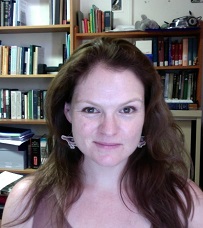Department of Literatures, Languages, Linguistics and Cultures
 Language and literature have shaped culture and social awareness throughout history. Our department has expertise in the literature of classical antiquity, the breadth of genres and styles of English literature (from Australia and the wider anglophone world), seven modern languages, cultures and literatures across Asia and Europe, and the way language works - our linguists engage with diverse communities all over the world, applying research to real world problems in language, cognition, and social equity.
Language and literature have shaped culture and social awareness throughout history. Our department has expertise in the literature of classical antiquity, the breadth of genres and styles of English literature (from Australia and the wider anglophone world), seven modern languages, cultures and literatures across Asia and Europe, and the way language works - our linguists engage with diverse communities all over the world, applying research to real world problems in language, cognition, and social equity.
All texts influence, and are influenced by, the times in which they were produced. Our teaching and research programs reflect many languages used across the global village. We foster the transcultural exchange and competence essential for successfully maintaining diversity and negotiating differences in the globalised era.
Our students learn to be effective communicators as well as critical and analytical thinkers through classical or modern literature in English and other languages, linguistics, reading and writing persuasive English texts, or as communicators in Chinese (Mandarin), French, German, Indonesian, Italian, Japanese and Spanish.
Our courses
Our range of courses explore the texts, stories, voices and forms of media that have shaped our understanding of our world and ourselves. They look in-depth at cultural influence and context. Our language courses suit learners at all levels from beginners to advanced.
Linguistics
Chinese
English
French
German
Indonesian
Italian
Japanese
Spanish
Our partnerships
With a global focus to our teaching and research, our partnerships also reach around the world. Our languages lecturers maintain strong and active links within their international countries of focus, and we are involved in many national and international networks and projects.
Our researchers have strong connections and partnerships with a large network of international universities. These partnerships facilitate unique and innovative programs, projects and opportunities for our students and researchers, and promote the development of teaching, learning and research both in English and in-language across the world. We have a particular interest in regional development and promoting equal educational opportunities for students and researchers outside metropolitan areas. Bengkulu University partnership for Indonesian teaching and research Our Indonesian Language and Culture staff have been building and diversifying our links and projects with the Indonesian government and higher education since a formal partnership with Bengkulu University (UNIB) began in 2016. Beginning with research, publications and mentoring roles, the partnership now includes residencies, student and staff exchanges, and a short-term study and cultural experiences for students each summer. Massey University partnership for Spanish language studies Our Spanish culture and language course has been offered at UNE through New Zealand's Massey University since 2011 through distance learning, with UNE hosting on-campus tutorials. Intensive contact courses are delivered twice yearly by Massey language staff. The partnership has enabled our department to offer Spanish as a major, rather than just an elective, and enabled exchange opportunities for our students. We also have partnerships with: Our researchers contribute to the Australian Research Council Centre of Excellence for the History of Emotions, which extends across nine universities and aims to bring research into the lives of Australians today. Along with other network activities, our English and arts researchers contribute to the network's highly regarded journal publications. More about the network. Supporting Armidale's Ezidi refugees We partner with refugee support services to assist in the settlement of Armidale's Ezidi community refugees. Project leaders: Associate Professor Liz Ellis (along with UNE's A/Professor Susan Feez, Dr Helen Harper and Dr Isabel Tasker). Language and social justice Cultural and linguistic differences can disadvantage individuals, even leading to wrongful convictions. Working with individuals, government and community organisations, our researchers have raised awareness of these differences and the inequalities they create. The aim is to facilitate fairer trials for people from diverse cultural and linguistic backgrounds. Examples:
Partnering with the Department of Human Services, Settlement Services International and Multicultural NSW, our lecturers have developed a short intensive pathways to university program to prepare young adults for university study and work. The program draws on our many years of expertise in teaching English as an additional language, and is funded by the Commonwealth Higher Education Participation and Partnerships Program (HEPPP).
Our research
Our research has a strong focus on cross-institutional collaboration and multidisciplinary activity. Our research topics of interest span history, texts, people, gender, art, culture and the environment.
Our researchers delve deeply into literature, both classic and contemporary, to gain and produce unique insights into the texts and authors that shape and reflect an understanding of ourselves and our place in the world. Our projects include: Children's literature Literary history and traditions Gender and literature Our researchers are concerned with environmental issues and events, such as drought and climate change, how they are reflected in literature and the arts, and how arts and literature can help mount a compelling argument for change. Our research involves practice-based research, which encourages multidisciplinary involvement and community activity and action for change. Our projects include: Our languages and culture research explores the people, events, literature and cultural phenomena of the countries and languages we specialise in, to add depth of knowledge and understanding to the influences on societies, the legacy of the past and considerations for the future. Our research includes: Implications of the Nagasaki bombing on the Catholic community Much has been written on the bombing of Hiroshima, but the impacts on the city of Nagasaki have not been thoroughly explored. This research project is contributing to a better understanding of the narrative and experiences around the atomic bombing of Nagasaki, especially within the heavily impacted Catholic community, bringing to light histories of marginalisation and the complex and long-lasting results of atomic warfare. The research includes a collective biography of 12 survivors, considering the connections between individuals and their community’s history, and their consciousness of historic communal marginalisation. Researcher: Dr Gwyn McClelland Connecting Australia and China for improved aged care The National Foundation for Australia-China Relations 2020-21 project showcases Australian excellence in aged care and promote connections and practical collaboration between TAFE Queensland and Shenyang government, China. It builds understanding and exchange in aged care between the two countries by developing training programs and exploring business opportunities for Australian aged care providers in Shenyang and vice versa. Wealthy Chinese elders are concerned about their wellbeing in their advancing years with many viewing their only child (as a result of one-child policy) as self-centred and untrustworthy. Strategically three tiers of collaboration have been designed, between TAFE and Chinese institutes, between TAFE and Chinese enterprises in aged care, and between Australian enterprises and Chinese enterprises, in the high-end market of aged care. This project is funded by the Department of Foreign Affairs and Trade (DFAT) Competitive Grants Program, which supports projects across mainland China, Hong Kong and Taiwan, Macau and Australia that broaden and strengthen Australia-China relations in education, business, culture and the arts. Researcher: Dr Shi Li Harnessing the power of multilingualism The majority of people travel through life interacting in more than one language. We seek to understand the experiences of multilinguals in a multilingual world. We look at individual repertoires, including language production and grammars in contact. We look at language ideologies, policies and choices and seek to elucidate the social mechanisms that shape the language landscapes of the world’s villages, towns, cities and nations. As societies change, we look for the instrumental role that language and linguistic expression plays in shaping those changes. Examples: Community language development Our linguists have been engaging in language description and documentation since the discipline was first established 30 years ago. Language endangerment is a critical threat to humankind; loss of linguistic diversity can be likened to loss of biological diversity, because languages give us insight into what it means to be human. The linguists at UNE work in partnership with indigenous language communities in Australia, Papua New Guinea, the Pacific, South Asia, and Africa, developing alphabets, writing systems, grammars, dictionaries, pedagogical and cultural materials for local consumption.
Researchers: Dr Cindy Schneider, Dr Arvind Iyengar, Adjunct A/Professor Nick Reid, Emeritus Professor Jeff Siegel, Adjunct Dr Margaret Sharpe.
Projects and activity
Our projects and activity across languages and literature demonstrates our passion for transforming theory into practice, encouraging broader community involvement, action and change across our subject and research areas.
The Armidale Climate and Health Project The Community Weathering Station (CoWS) is a community-based initiative concerned with for discussing and developing local ways of responding to global climate change, while pursuing social justice at the same time. CoWS emerged from creative experiments with the Weathering Collective, and has facilitated a range of events such as lectures, workshops and breakfasts with researchers, artists, mechanics, scientists and, now, doctors. Find out more on the Community Weathering Station website. Lead researcher: Dr Jennifer Mae Hamilton Our lecturers are passionate about sharing their knowledge in language and culture with the community, promoting wider interest and participation. Indonesian language and culture Our Indonesian language and culture discipline encourages involvement in and enjoyment of Indonesian culture, including through: Researcher: Dr Jane Ahlstrand HSC booster days Our staff in the English discipline regularly participate in UNE’s HSC Booster Days, which assist Year 12 students in their learning for their end of year exams and steps toward university. We're interested in fostering as many links as possible with schools in regional and remote NSW. Most children around the world learn at least two languages at home and school, but Australian children are lagging behind. A current funded research project is looking in-depth at a range of successful language programs across the three Australian states of NSW, Queensland and Victoria, from the policy to the resources and student progress. Researchers are looking for best practice and the support and resources required in schools to encourage more linguistically and culturally competent young Australians who are able to effectively engage in a plurilingual, globalised world. The project, entitled Starting young: Early years languages learning in Australia 2019–2021 is supported by an Australian Research Council Discovery Grant. Researchers: Associate Professor Liz Ellis, Professor Anne-Marie Morgan (James Cook University), Professor Joseph Lo Bianco (Melbourne University) and Professor John Hajek (Melbourne University).
With a new $25,000 grant from AdaptNSW, the initiative will build partnerships with local organisations via workshops and a small festival for a new Armidale Climate and Health Project. Dr Hamilton is working on this project with Dr Sujata Allan, a local GP and adjunct senior lecturer at UNE.
Contact us
To find out more about our department, please contact:
 Head of Department, Literatures, Languages and Cultures
Head of Department, Literatures, Languages and Cultures
Dr Sarah Lawrence
Email: hasshod-litlangcult@une.edu.au

